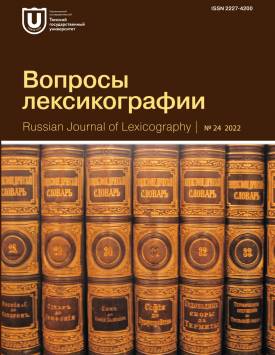Precedent phenomena from children’s literature and their lexicographic description
Precedent phenomena from texts of children’s literature occupy a significant place in the thesaurus of a contemporary. They are regularly reproduced in various types of texts, many of them have already established themselves in the lexical and phraseological system of the language as independent units (Doctor Aibolit, Cinderella) and are presented in dictionaries of various types. The article substantiates the need to describe this part of the intertextual thesaurus in a special dictionary. The experience of creating a concise dictionary of precedent phenomena related to children’s literature, functioning in modern speech, and being an integral part of the cultural memory of the Russian language personality is described. The composition of the dictionary and the components of the dictionary entry are characterized, the possibilities of interpretation of intertext elements are shown. Many elements of children’s reading are firmly fixed in the lexical system of the language, as evidenced by their inclusion in entries of explanatory dictionaries. The components that go back to texts of children’s literature are also presented in the phraseological part of dictionary entries or as illustrative material. Not all precedent phenomena acquire linguistic stability, but they are actively reproduced in oral and written speech and are potentially ready to enter the lexical and phraseological system. An attempt to create a dictionary was made in the publication Little Son Came to His Father: Precedent Names and Sayings From Children’s Literature. An Experience of a Dictionary. The words chosen as the title are lines from Vladimir Mayakovsky’s poem “What is Good and What is Bad”, written in 1925; they are actively functioning in speech today. However, these words also contain a second significant meaning - a dialogue of different generations. Attention to precedent names and statements from children’s literature is very important today in connection with the urgent problems of preserving the national cultural code, without which neither adequate understanding of texts nor effective communication of representatives of different age, cultural, and social groups is possible. Precedent statements and precedent names from Soviet children’s literature, which for decades have been (and partly still are) a significant component of children’s reading, are widely represented in the “experience of a dictionary”. The dictionary presents fairly widely precedent phenomena from the texts of Russian literature, traditionally included in the circle of children’s reading. The texts of foreign children’s literature from different eras are also significant in the intertextual thesaurus; precedent phenomena from them have been included in the dictionary. The source of the contexts of use in the dictionary were the materials of the Russian National Corpus, as well as examples collected by the compilers, including from the texts of the latest Russian fiction. The nominations functioning in the space of a modern city were also taken into account. The number of illustrations given in dictionary entries varies. It depends on the degree of representation of a phenomenon in written sources, but does not always coincide with its actual prevalence in live speech. Precedent names occupy a special place in the dictionary. The authors declare no conflicts of interests.
Keywords
precedent phenomenon, children’s literature, cultural memory, language personality, dictionary entry, national cultural code, intertextual thesaurusAuthors
| Name | Organization | |
| Cherniak Valentina D. | Herzen State Pedagogical University of Russia | vdcher@yandex.ru |
| Sidorenko Konstantin P. | Herzen State Pedagogical University of Russia | sidorenko274@yandex.ru |
| Nosova Elena P. | Gymnasium 205 | elena.awesomenights@yandex.ru |
References

Precedent phenomena from children’s literature and their lexicographic description | Voprosy leksikografii – Russian Journal of Lexicography. 2022. № 24. DOI: 10.17223/22274200/24/5
